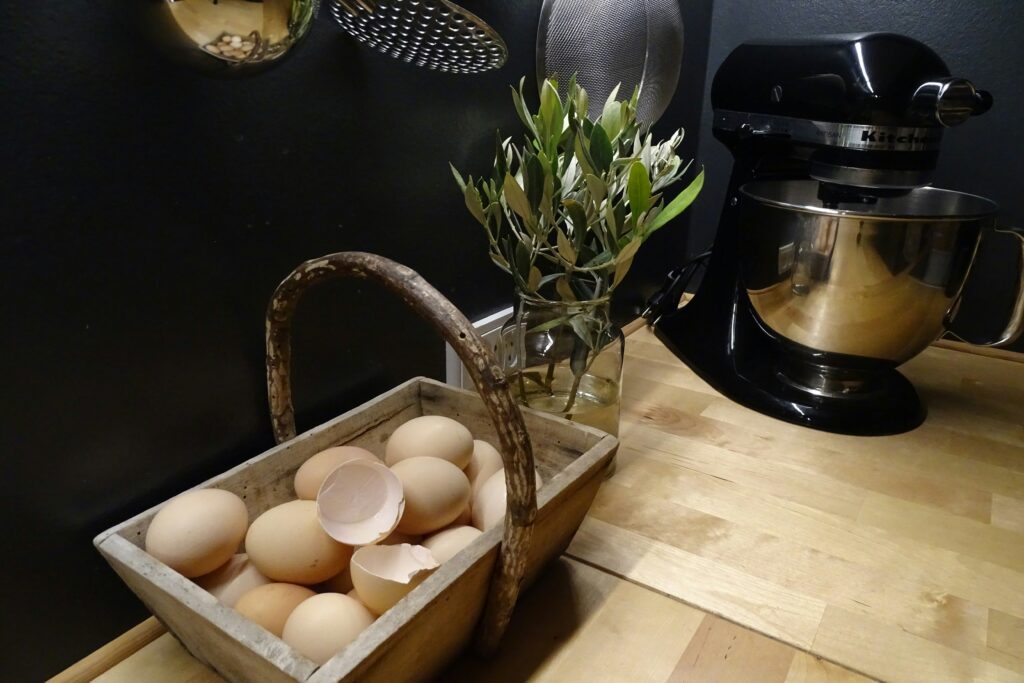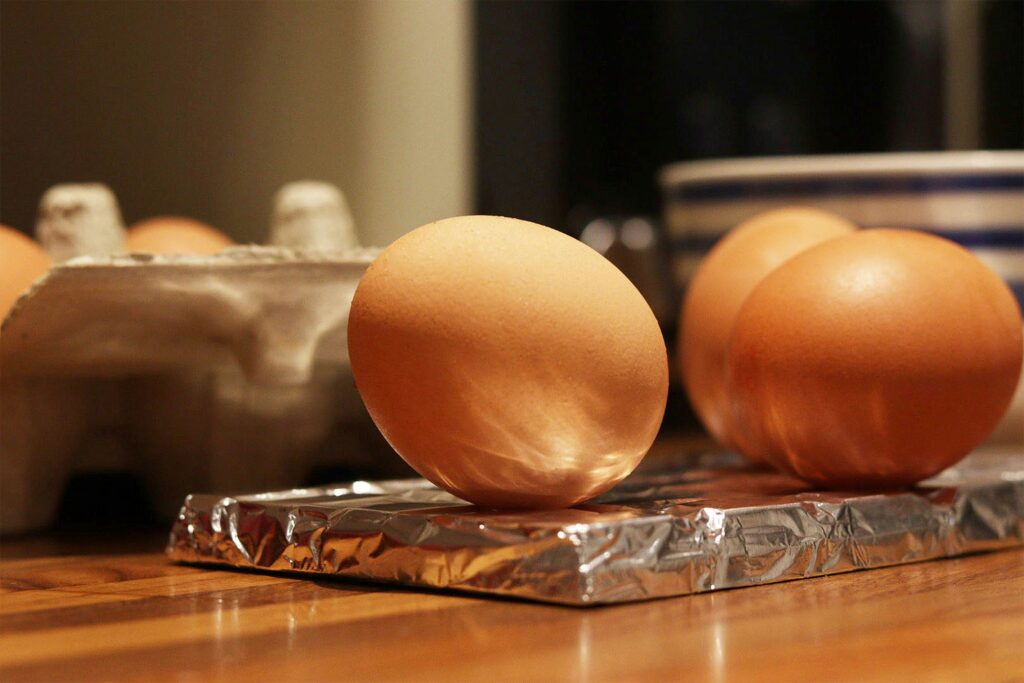Introduction: How Long Do Farm Fresh Eggs Stay on the Counter?
If you’re raising backyard chickens or sourcing directly from a local farm, you’re probably wondering: How long do farm fresh eggs stay on the counter? The answer is a little more nuanced than a simple “yes or no.” With the right conditions and proper handling, farm-fresh eggs can remain safe at room temperature for 2 to 3 weeks — sometimes even longer. But the devil’s in the details.
In this guide, we’ll break down everything you need to know — from the science behind the natural coating of eggs to safe storage practices, risks, global storage differences, and more. Whether you’re a homesteader, urban chicken keeper, or a conscious consumer, these expert tips will help you protect your eggs’ freshness and safety.

Photo by Olga Petnyunene on Unsplash
Understanding the Natural Coating of Farm Fresh Eggs
Freshly laid eggs come with a natural protective layer called the bloom or cuticle. This coating seals the pores in the eggshell, preventing bacteria from entering and moisture from escaping.
Why the Bloom Matters:
- Acts as a natural antibacterial barrier
- Keeps the egg’s internal environment stable
- Allows for room-temperature storage if left intact
Once an egg is washed, the bloom is stripped away, significantly decreasing its shelf life when kept outside refrigeration.
Ideal Counter Storage Conditions
Eggs might seem sturdy, but they’re surprisingly sensitive to their environment. To safely store unwashed farm eggs on the counter:
| Condition | Recommended Range |
| Temperature | 50°F to 70°F (10°C to 21°C) |
| Humidity | 40% to 60% |
| Light exposure | Low light or dark pantry |
| Airflow | Well-ventilated area |
Keep them out of direct sunlight, away from the stove, and preferably in a ceramic or breathable container.
How Long Can Unwashed Farm Fresh Eggs Stay on the Counter?
Unwashed farm eggs typically last up to 3 weeks on the counter under optimal conditions. In countries like the UK or France, it’s common to leave eggs out for days or weeks because they’re not washed or bleached after collection.
Guidelines:
- USDA recommendation: Refrigerate within 24 hours (due to washing)
- EU practices: Unwashed eggs can sit out 2–3 weeks
- Homesteader insight: 2 weeks on counter, then move to fridge if not used
What Happens When You Wash Farm Eggs?
Washing removes the protective bloom, making eggs vulnerable to:
- Bacterial invasion
- Faster spoilage
- Shell degradation
If you must wash eggs:
- Use warm (not cold) water
- Dry immediately
- Refrigerate right after
Signs That Eggs Are No Longer Fresh
Here’s how you know your eggs have turned:
- Smell: A foul, sulfur-like odor indicates rot
- Appearance: Cracks, slimy texture, or discoloration
- Float test: If it floats, it’s likely old (see next section)
When in doubt, crack it into a separate bowl before adding it to recipes.
How to Conduct the Float Test for Egg Freshness
The float test is a simple, reliable method to gauge freshness.
Steps:
- Fill a glass bowl with cold water.
- Gently place the egg in.
- Observe:
| Result | Meaning |
| Lays flat | Very fresh |
| Tilts slightly | About 1 week old |
| Stands upright | 2–3 weeks old |
| Floats | Likely spoiled – toss it! |

Photo by Torben Varming on Unsplash
Room Temperature vs Refrigeration: Which Is Better?
Room Temperature Pros:
- No condensation (which can pull bacteria in)
- Ideal for baking (room-temp eggs whip better)
Refrigeration Pros:
- Longer shelf life (up to 3 months)
- Safer if eggs are washed
Verdict: If unwashed, counter storage is fine short-term. Washed? Fridge it.
Are There Risks to Leaving Eggs on the Counter?
Yes — especially if:
- Your kitchen exceeds 75°F (24°C)
- You live in a humid climate
- You washed the eggs first
The biggest threat is Salmonella enteritidis, a bacterium that can contaminate eggs internally. Though rare, it’s more likely in warm, unsanitary environments.
According to CDC guidelines, eggs should be refrigerated in the U.S. due to cleaning standards.
Storing Eggs for Longer Periods
If you want to preserve eggs for months, consider:
- Refrigeration: Best for daily use
- Freezing: Crack and freeze in ice cube trays
- Oil coating: Use food-grade mineral oil
- Water glassing: Submerge in pickling lime + water
Some of these methods extend usability up to 9 months with proper care.
Cultural and Global Perspectives on Egg Storage
| Region | Common Practice | Reason |
| USA | Refrigerated | Washed, removes protective bloom |
| Europe | Room temp | Unwashed, retained bloom |
| Asia | Mixed (urban vs rural) | Some use refrigeration, others don’t |
These practices are influenced by food safety policies and climate conditions.
Tips for Buying and Storing Fresh Eggs Safely
- Buy from trusted local farms
- Check for clean, crack-free shells
- Store pointy-end down to retain air cell
- Label with collection dates
Egg cartons, reusable containers, or ceramic egg trays help preserve freshness on the counter or in the fridge.

Photo by Abby Churchill on Unsplash
Farm Fresh vs Store Bought Eggs: Shelf Life Comparison
| Type | Counter Shelf Life | Refrigerated Life |
| Farm Fresh | 2–3 weeks (unwashed) | 2–3 months |
| Store Bought | Not recommended | 3–5 weeks |
Store-bought eggs are often already 30+ days old by the time they reach your fridge. Farm eggs? Much fresher.
How to Label and Track Egg Freshness
Stay organized with a simple system:
- Use wax pencil or marker to date each egg
- Practice FIFO: First In, First Out
- Create a small egg journal or use egg tracker apps
This ensures you rotate properly and reduce food waste.
Storing Eggs During Hot Weather
In summer months:
- Avoid leaving eggs near windows or ovens
- Use coolers or cellar spaces
- Consider transitioning to refrigeration after a week
High temps accelerate spoilage and increase bacterial risks.
Storing Duck, Quail, and Other Poultry Eggs
Not all eggs are created equal:
| Type | Counter Shelf Life | Refrigerated |
| Duck | 1–2 weeks | 6–8 weeks |
| Quail | Up to 3 weeks | 2–3 months |
| Goose | 1 week max | 5–6 weeks |
Duck eggs have larger pores — more prone to contamination if washed.
FAQs About Farm Fresh Egg Storage
Q1: Can I leave farm fresh eggs out all year round?
Yes, if unwashed and stored in a cool, dry place. But in warmer seasons, move to refrigeration after 7–10 days.
Q2: How can I tell if an egg is bad without cracking it?
Use the float test. A floating egg usually means it’s spoiled.
Q3: Is it safe to eat an egg that stands upright in water?
Yes, it’s older but still safe if it doesn’t float. Use soon.
Q4: Do I need to wash eggs before using them?
No. Washing removes the bloom. If needed, do so right before use and cook immediately.
Q5: Can I refrigerate eggs that have been on the counter?
Absolutely. If they’re unwashed and stored properly, you can refrigerate to extend freshness.
Q6: Do all countries refrigerate eggs?
No. In Europe and many parts of Asia, eggs are sold and stored at room temperature due to different sanitation processes.

Photo by engin akyurt on Unsplash
Conclusion
Farm fresh eggs offer superior taste and nutritional value — but storing them safely is essential. Unwashed eggs can sit on the counter for up to 3 weeks, especially when kept in ideal conditions. After that, a move to refrigeration ensures longevity. Know the signs of spoilage, respect the role of the bloom, and follow global best practices to make the most of your eggs.
